How Ahmadi Muslims Strived for Hindu-Muslim Unity
Islamic Teachings Regarding Love for Nation and Obedience to Government
Being a purely religious and non-political organization, the Ahmadiyya Muslim Community has always strived for peace. But those unaware of history wrongly assume that this community is responsible for the partition of India.
25 December 2020
The partition of India has become such a topic that different political and non-political parties blame one another for the incident in order to fulfil their vested interests. In this regard, the Ahmadiyya Muslim Community, which is a purely religious and non-political organization, and is well-known for its advocacy for peace and brotherhood, is also not spared. However, a just review of historical facts categorically disproves the notion that the Ahmadiyya Muslim Community was responsible for the partition of India.
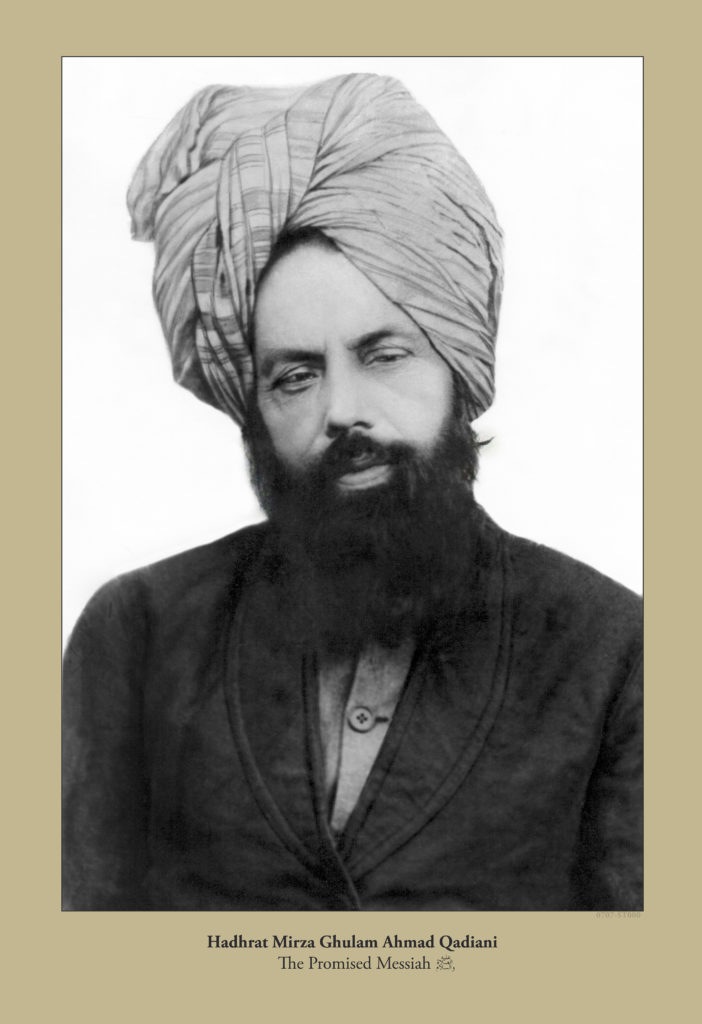
Days prior to his demise, the Holy Founder of the Ahmadiyya Muslim Community, Hazrat Mirza Ghulam Ahmadas, penned a treatise named A Message of Peace. In the book, which was a sincere expression of his love for his motherland, he called Hindus and Muslims, the two great communities inhabiting India, to unite with each other. He said:
O compatriots! This short epistle entitled A Message of Peace is being presented to you with all due respects and with a sincere heartfelt prayer that Almighty God may Himself inspire you and fill your hearts with trust in my sincerity, lest you misread this friendly gesture and consider it to be an attempt to gain some ulterior motive.[1]
He further says:
Hence, Ahmadi Muslims, who tread in the footsteps of their founder, have always held aloft the flag of unanimity and have always strived for ending dissension.
Anyone who studies history will find that Ahmadis have always tried to unite Hindus and Muslims. Whenever there arose a dispute between the two communities, the Caliphs and the leaders of the Ahmadiyya Muslim Community took all measures to resolve it, through letters and advice, and by meeting the leaders of the two communities, urging them to work towards peace.
When the days of India’s freedom drew near, the then worldwide head and the Second Caliph of the Ahmadiyya Muslim Community, Hazrat Mirza Bashiruddin Mahmud Ahmadra, realized the dire need of maintaining communal harmony, especially between Hindus and Muslims, and took efforts towards the same. He proclaimed:
In this precarious time, I urge my countrymen that they free their hearts from enmity and prejudice, for however sweet and pleasing such emotions may seem, they are the most bitter and can inflict the greatest harm.
As the events unfold, it seems that the days of India’s freedom have arrived. God is breathing a new spirit into our hearts and the light of hope is shining from behind the clouds of darkness. Despair not if the darkness is getting gloomier, for when the light manifests itself, it will give way to brighter lights to come and will manifest God’s will.
Hence, let not the hatred in your hearts turn God’s mercy into His wrath, and His grace into His anger, for He dislikes anyone who is stubborn, and he who is averse to truth…. Oppression is wrong; no matter if a British commits it or an Indian. Hence, try to reach a conclusion, through love and kindness, that the hearts are purified from all forms of hatred. Establish such a government that it marks a new era of love and unanimity. Remember! The world is one organic whole, of which, different nations are different parts….. Hence, adopt such means that India becomes a strong brick in the foundation of a peaceful and united world.[3]
Addressing a huge gathering of Hindus and Muslims, the Second Caliph of the Ahmadiyya Muslim Community delivered a public speech at Bradlaugh Hall Lahore on 14 November 1923. In the speech, he said that the only solution to the prevailing situation was for the Hindus and Muslims to unite with each other. His Holiness laid down such guiding principles, acting upon which the two communities could live together peacefully.
In the speech, his Holiness also referred to those people who wrongly assumed that Ahmadis were the ones creating rift between people. He said:
Some people think that we are the cause of disorder in society. They assume that we are the ones creating rift in friendly relations. However, the truth is that we are the greatest enemies of dissension. Of all things, conflict is the farthest from our hearts. We abhor all such things that may eventually lead to conflict. Else, we are eager to offer any sacrifice for a cause, of which we know, that it will further the prosperity of our nation.[4]
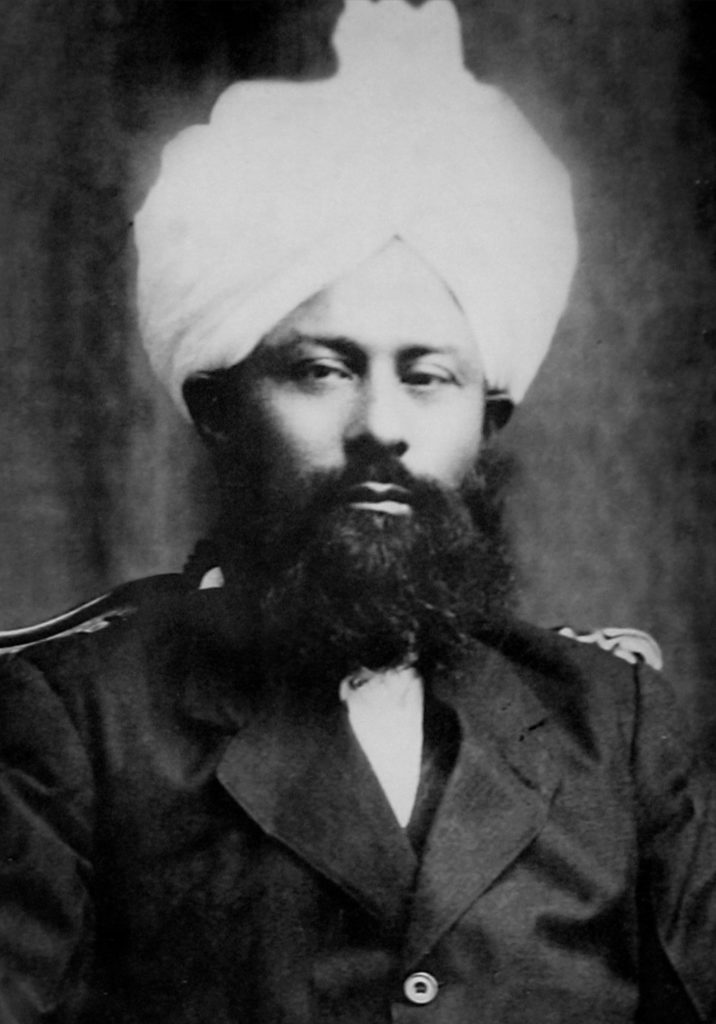
In his speech, the Second Caliph of the Ahmadiyya Muslim community also reminded that doctrinal disagreements between Hindus and Muslims should not become an obstacle in their worldly relations. He addressed both the communities saying:
Disagreement in matters of religion is not an impediment to good relations… It is not appropriate for Muslims to sever worldly relations with them (Hindus) and not reconcile with them because of doctrinal differences. There is no religion that forbids its followers from uniting with people of other faiths in non-religious matters. Nor does any religion exhort its adherents to always fight with others. Human instinct simply refutes this idea. Any religion that teaches this notion will be rejected by man.
Hence, when religious disagreements are not a matter of discord in worldly affairs, why is there hostility between Hindus and Muslims? On the one hand, the prevailing circumstances demand from them to unite while on the other, their religions also exhort them to live as brothers. Despite this, why is there dissension instead of unanimity between the two communities? [5]
Through this speech, his Holiness guided Hindus and Muslims on how they can live peacefully in India, protecting each other’s rights and respecting each other’s sentiments.
In the wake of India’s rising demand for self-governance, a series of Round Table Conferences were held in England, of which, the first conference took place in 1930. Many leaders from the Hindu and Muslim communities were invited to take part in this.
On this occasion, the second Caliph of the Ahmadiyya Muslim Community authored a short treatise named “The Solution of Current Political Issue of India”. The book was made to reach London at the time of the conference so as to guide the members who were to take part in the conference as well as the British government towards making just decisions.
The book was a scholarly analysis of the prevailing situation of India and presented a very satisfactory solution to the political problems of the time. His Holiness amply made it clear that the most important matter in the political development of the country should be regarding the minority rights and their position in independent India. His intense desire for peace and ardent wish for Hindu-Muslim unity is well demonstrated in these words.
I remind the members of the Round Table Conference, Members of Parliament and all representatives of India and Britain that God has entrusted them with a grave responsibility. Hence, they should free themselves from prejudice and fulfil this duty in a selfless manner. If they do so, their names will always be remembered with great reverence. Moreover, the coming generations, who will be benefitting from their decisions, will always pray for them, and above all, they will become recipients of God’s bounty.
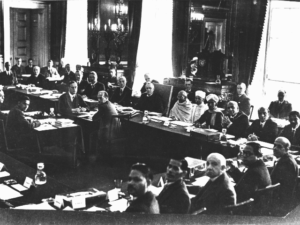
Selfishness is harmful even in matters that are temporary in nature. However, it would be a great injustice if personal enmity and selfish motives are let to overrule decisions, especially in such affairs that can last thousands of years and affect millions of people. Hence, I pray to God that He may keep your motives pure, morale high and minds sharp. May this conference and the decisions resulting from this conference be a cause of peace between India and Britain, and unity between Hindus and Muslims. Then, we can say that we have successfully fulfilled our responsibilities towards God and towards people; both of our time and of the coming generations.[6]
The book received a great response and many leaders sent letters of gratitude to his Holiness and also wrote reviews applauding his efforts and views.
The Second Round Table Conference was viewed with much anticipation because of the participation of the Indian National Congress. Sir Zafarullah Khanra made all efforts to bring the two parties, the Congress and the Muslim League, to an understanding, but to no avail.
Later, with the failure of the Cripps Mission, a great discord had developed between India and Britain, so much so that an agreement seemed almost impossible in the situation. At such a delicate time, the Second Caliph of the Ahmadiyya Muslim Community, guided by Divine visions and revelations, urged the two nations towards creating peace. He said:
It is time that Britain made peace with the countries under its empire, especially India. It should forget all the past disparities with India and reconcile with it, so that both countries may strengthen the foundations of global development and world peace. O Britain! It is better for you to make peace with India…. Similarly, I suggest that India also let go of all past disputes with Britain.
I extend the message of peace to the world. I invite Britain to come and make peace with India. Similarly, I request India to go and make peace with Britain. I also urge each and every community of India with great respect and utmost humility that they reconcile with each other. I assure every community that we are ready to make peace with them in worldly matters. I want to make it clear that we have enmity towards no one. We have no enmity to the Congress, nor are we the enemies of the Hindu Mahasabha. We have no animosity towards the Muslim League, nor are we against the Unionist Party (Zamindara League) or the Khaksar Movement. By God, we have no enmity towards the Ahrar either. We are well-wishers of everyone. We are only against those matters, which interfere with our religion. Otherwise, we are no one’s enemy. What we wish is to be left alone so that we can fulfil our responsibilities towards God and serve His creation.[7]
These words of his Holiness are enough to prove that the Ahmadiyya Muslim community has always worked towards peace and not against it.
It is a common experience that disputes are solved through discussions and dialogues. If this remedy is ignored or the leaders of the disputing parties fail to establish peace through such means, the consequences may last for generations, who will be bound to face its ill-effects. Unfortunately, this seems to be the case in the Indian subcontinent.
In 1946, the dispute between the Congress and the Muslim League was getting worse. With the days of India’s freedom approaching, it was clear that if the disparities were not solved immediately, they may give way to decades-long conflict.
His Holiness continued his efforts to unite Hindus and Muslims of India. In 1946, when the Cabinet Mission came to Delhi to settle the political conflict that was on the rise, his Holiness drew the attention of the members of the mission, the Muslim League and the Congress towards their responsibilities and urged them to solve the issue in a just manner. He advised the mission saying:
I tell the members of the mission if they fulfil the requirements of justice, they will certainly succeed in creating peace between Hindus and Muslims….. If peace is established in India through dialogue and understanding, it will definitely prove to be beneficial for India and the whole world.
Similarly, his Holiness advised the Muslim representatives and said:
I tell the Muslim representatives that India belongs to us as it belongs to the Hindus. The actions of some wrongdoers should not prompt us to act in a way that will weaken our nation. We have played a vital role in establishing this great nation…. We have strived for 800 years for the progress of this country. Corpses of those patriots who have laid their lives for this nation can be found all across the country, from Peshawar to Manipur, and from the Himalayas to Madras. Similarly, Islamic monuments can be found in all regions. Hence, are we to bid goodbye to all of them? Are we still to think that India belongs to Hindus alone? Nay, India belongs to us more than it belongs to the Hindus.
His Holiness further said:
I wish that, with mutual agreement, we continue to live together in this country as we have been living for a long time…. Hence, I advise that this problem be solved peacefully and not through forceful means. I assure Hindus that I have sincere feelings for them, in the sense that I wish Hindus and Muslims become united, so that these step-brothers may live in this country as true brothers…. I urge that all measures be taken to preserve the unity of India.
His Holiness addressed the Hindus in these words:
I say to my Hindu brothers, especially the members of the Congress…. that our decisions should be entirely based on morality…. In this precarious situation, take decisions based on morality…. This is a time to seriously think about how our nation can gain freedom, in a way that all people remain happy. Otherwise, our freedom will only be akin to changing prisons.[8]
His Holiness’s efforts were not limited to writing letters or sending messages. Instead, he used all means to establish peace in India. In September 1946, his Holiness travelled to Delhi, which, in those days, had become the centre of political activities in the country. He met with Maulana Abul Kalam Azad, Pandit Jawaharlal Nehru, Mahatma Gandhi, and various other leaders, and also sent letters to many.
During his meeting with various leaders in Delhi, the Ahmadiyya Caliph told them that their mutual conflict was not fair. He said that the Congress should compromise some things, and the Muslim League should compromise some things, lest the conflict evolves into a very dangerous crisis. His Holiness said:
While you fight, it is the lives of those thousands of people that get affected, who live in small towns and villages, and are completely alien to the concept of civility. They will kill each other, plunder each other’s wealth and burn each other’s houses. For instance, in Dhaka, as a result of the conflict between the League and the Congress, our library and mosque were burnt, while we did not fight. We are totally against creating disorder. But the Hindus who burnt our mosque and library thought that they have made a great accomplishment. This proves that such discordances will blind man’s instinct and he will become incapable of distinguishing between right and wrong.[9]
Hence, his Holiness told them to do something about it but was only replied that it was him who was capable to do it, and not them.[10]
History later proved that his Holiness’s each and every word of caution was fulfilled to the letter. No unity or understanding could be established between the Congress and the Muslim League until India’s freedom.
Hence, for safeguarding the rights of all people, the Ahmadiyya Muslim Community left their homeland. Even at that time, the Caliph of the Ahmadiyya Muslim Community made all efforts to minimize the loss that may result from this inevitable occurrence. The land of Punjab was painted red with blood, so much so that no parallel to this can be found in the entire history of the region. Millions were massacred and many more were forced to leave their homeland in order to save their lives.
The Ahmadiyya Muslim Community has always strived for peace and unity. But it is unfortunate that such a community is accused of being the ones behind the partition of India. Some historical facts have been presented here, a just review of which may help any person to reach the truth.
Obeying the government is obligatory; be it a Muslim government or a non-Muslim government. The Second Caliph of the Ahmadiyya Muslim Community says:
The Holy Prophetas has emphatically commanded to obey the government or ruler. He says, “It is obligatory for you to listen to the ruler and obey him in adversity and prosperity, in pleasure and displeasure, and even when another person is given (rather undue) preference over you.”[11]
Similarly, it is reported that the companions asked the Messenger of Allah: O Prophet of Allah, what do you think if we have rulers who rule over us and demand that we discharge our obligations towards them, but they (themselves) do not discharge their own responsibilities towards us? What do you order us to do? The Messenger of Allah avoided giving any answer at first, but when the question was repeated, the Prophetsa said: Listen to them and obey them, for on them shall be their burden and on you shall be your burden.[12]
There is no mention or even a hint in the abovementioned narrations that limits the scope of obedience to Muslim rulers. It should be remembered that no one is bound to live in any particular country or under any particular ruler, but when a person chooses to live in a country, he is bound to abide by its laws.
“It is obligatory for you to listen to the ruler and obey him in adversity and prosperity, in pleasure and displeasure, and even when another person is given (rather undue) preference over you.”
The Ahmadiyya Muslim Community has now been established in above 210 countries around the world. The members of the community, whichever country they live in, promote love and brotherhood, and are loyal to their nation. The worldwide head of the Ahmadiyya Muslim Community, Hazrat Mirza Masroor Ahmadaba is spreading this message all across the globe. Here I present some excerpts from his speech titled “Love and Loyalty to One’s Nation Is a Part of Faith” which he had delivered at the Military Headquarters Germany.
It is very easy to simply speak of, or hear the words, ‘loyalty and love for one’s nation.’ However, in reality these few words encompass meanings that are wide-ranging, beautiful and of tremendous depth. Indeed, to fully comprehend and understand what these words truly mean and what they require is actually very difficult. In any case, in the short time available, I will try to explain Islam’s concept of loyalty and love for one’s nation.
First and foremost, a fundamental principle of Islam is that a person’s words and deeds should never manifest any form of double standards or hypocrisy. True loyalty requires a relationship built on sincerity and integrity. It requires what a person displays on the surface to be the same as what lies beneath. In terms of nationality, these principles are of the utmost importance. Therefore, it is essential for a citizen of any country to establish a relationship of genuine loyalty and faithfulness to his nation. It does not matter whether he is a born citizen, or whether he gains citizenship later in life, either through immigration or by any other means.
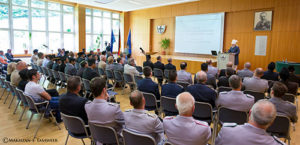
Loyalty is a great quality, and the people who have displayed this attribute to the highest degree and best standards, are the Prophets of God. Their love and bond with God was so strong that in all matters they kept in view His commands and strived to fully implement them, no matter what. This illustrated their commitment to Him and their perfect standards of loyalty. Hence, it is their standards of loyalty that we should use as an example and model. However, before proceeding any further, it is necessary to understand what is actually meant by ‘loyalty’.
According to the teachings of Islam, the definition and true meaning of ‘loyalty’ is the unequivocal fulfilment of one’s pledges and covenants at every level and under all circumstances, regardless of difficulty. This is the true standard of faithfulness required by Islam. At various places in the Holy Qur’an, Allah has instructed Muslims that they must fulfil their pledges and covenants, because they will be held to account by Him over all undertakings that they have made. The Muslims have been instructed to fulfill all covenants, including those made with God Almighty, and also all other pledges they have made, according to their respective degrees of importance.
In this context, a question that could arise in the minds of people is that because Muslims claim that God and His religion are of paramount importance to them, thus it follows that their pledge of loyalty to God will be their first priority, and that their covenant to God will be what they value above all else and which they endeavour to fulfil. Therefore, the belief may arise that a Muslim’s loyalty to his nation and his pledge to uphold the laws of the land will only be of secondary importance to him. Thus, he may be willing to sacrifice his pledge to his country on certain occasions.

To answer this question, I would firstly like to inform you that the Holy Prophet Muhammad (peace be upon him) himself taught that the ‘love for one’s nation is a part of faith.’ Thus, sincere patriotism is a requirement in Islam. To truly love God and Islam requires a person to love his nation. It is quite clear, therefore, that there can be no conflict of interest between a person’s love for God, and love for his country. As love for one’s country has been made a part of Islam, it is quite clear that a Muslim must strive to reach the highest standards of loyalty to his chosen country, because that is a means of reaching God and becoming close to Him. Hence, it is impossible that the love a true Muslim holds for God could ever prove to be an impediment or barrier preventing him from displaying true love and faithfulness towards his country.
We find that in certain countries, religious rights are curtailed or even completely denied. Therefore, another question that can arise is whether those people who are persecuted by their state can still maintain a relationship of love and loyalty to their nation and country.
In such circumstances, Islam advocates that where persecution goes beyond all limits and becomes unbearable, then at that time, a person should leave the town or country and migrate to a place where he is free to practise his religion in peace. However, alongside this guidance, Islam also teaches that under no circumstances should any individual take the law into his own hands and nor should he partake in any schemes or conspiracies against his country. This is an absolutely clear and unequivocal command given by Islam.
Another teaching given by the Holy Qur’an in relation to loyalty is that people should keep away from all things that are immodest, undesirable and that form any type of rebellion. A beautiful and distinguishing feature of Islam is that it does not just draw our attention to the final point of culmination, where the consequences are extremely dangerous; instead, it warns us about all of the smaller issues as well, which act as stepping stones leading mankind to a path paved with danger. Thus, if Islam’s guidance is followed properly, then any issue can be resolved at the earliest point, before the situation gets out of hand.
An issue which can gravely harm a country is financial greed by individuals. Often, people get consumed by material desires that spiral beyond control, and such desires ultimately lead people to act in a disloyal fashion. Thus, such things can ultimately be a cause of treachery against one’s country. Let me explain a bit. In Arabic the word bagha has been used to describe those people or those acts of people that cause harm to their countries. It refers to those who take part in wrong practices or who inflict harm on others. It also includes those people who commit fraud and so try to acquire things in an illegal or 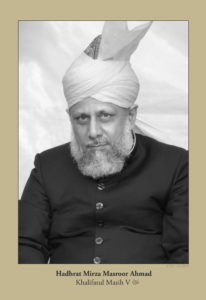 unjust manner. It refers to those people who transgress all limits and so cause harm and damage. Islam teaches that people who act in these ways cannot be expected to act in a loyal manner, because loyalty is intertwined with high moral values. Loyalty cannot exist without high moral values and high moral values cannot exist without loyalty. Whilst it is true that different people may have different views about high moral standards, yet the religion of Islam revolves solely around seeking God’s pleasure. Thus, Muslims are instructed to always act in a manner that is pleasing to Him.
unjust manner. It refers to those people who transgress all limits and so cause harm and damage. Islam teaches that people who act in these ways cannot be expected to act in a loyal manner, because loyalty is intertwined with high moral values. Loyalty cannot exist without high moral values and high moral values cannot exist without loyalty. Whilst it is true that different people may have different views about high moral standards, yet the religion of Islam revolves solely around seeking God’s pleasure. Thus, Muslims are instructed to always act in a manner that is pleasing to Him.
In short, according to Islamic teachings, God Almighty has forbidden all forms off treachery or rebellion, whether against one’s country or one’s government. This is because rebellion or acting against the state is a threat to the peace and security of a nation. Indeed, where internal rebellion or opposition occurs, then it fans the flames of external opposition and encourages outsiders to take advantage of the internal disorder. Hence, the consequences of disloyalty to your nation can be far-reaching and extreme. Thus, anything that can cause harm to a nation is included in the term bagha that I have described. Keeping all of this in mind, loyalty to one’s nation requires a person to display patience, to show morality and to follow the laws of the land.
In the modern era, most governments are run democratically. Therefore if a person or group wishes to change the government, then they should do so by following the proper democratic process. They should make themselves heard by voting at the ballot box. Votes should not be cast on the basis of personal preferences or personal interests, but in fact, Islam teaches that a person’s vote should be exercised with a sense of loyalty and love for his country. A person’s vote should be cast with the betterment of the nation in mind. Therefore, a person should not look at his own priorities and from which candidate or party he can personally benefit; instead, a person should make his decision in a balanced way whereby he assesses which candidate or party will help the entire nation progress. The keys to government are a huge trust and thus they should only be handed over to the party who the voter honestly believes is best suited and most deserving. This is the true Islam, and this is true loyalty.
Indeed, in Chapter 4, verse 59 of the Holy Qur’an, Allah has commanded that a person should only hand over trusts to those who are entitled, and that when judging between people, he should make his decision with justice and honesty. Thus, loyalty to one’s nation requires that the power of the government should be given to those who are truly entitled to it, so that the nation can progress and come to stand at the forefront amongst the nations of the world.
In many parts of the world we find that members of the public take part in strikes and protests against government policies. Furthermore, in certain Third World countries, the protesters vandalise or damage possessions and properties belonging either to the state or to private citizens. Though they may claim to be acting out of love, the truth is that such acts have nothing to do with loyalty or love for the nation. It should be remembered that even where protests or strikes are conducted peacefully, without recourse to criminal damage or violence, it still can have a very negative effect. This is because even peaceful protests often result in a loss of millions to the economy of the nation. Under no circumstances can such behaviour be considered to be an example of loyalty to the nation. A golden principle taught by the Founder of the Ahmadiyya Muslim Jama’at was that under all circumstances, we must always remain obedient to Allah, to the Prophets and to the rulers of our nation. This is the same teaching given in the Holy Qur’an. Hence, even where a country permits strikes or protests to take place, they should only be conducted to the extent where they do not harm or cause damage to the nation or to the economy….
Thus these are just a few aspects of Islamic teachings, which guide all true Muslims towards the real requirements of loyalty and love for one’s country.
Today we observe that the world has become a global village. Mankind has become very closely knit together. The people of all nations, religions and cultures are found in all countries. This requires that the leaders of every nation should consider and respect the feelings and sentiments of all people. The leaders and their governments should strive to create laws that foster an environment and spirit of truth and justice, rather than making laws that are a means of causing distress and frustration to the people. Injustices and cruelties should be eliminated and instead we should strive for true justice.
The world should come to recognise its Creator. Every form of loyalty should be linked to loyalty with God. If this occurs then we will come to witness with our own eyes that the very highest standards of loyalty will be established by the people of all countries and new avenues leading us to peace and security will open throughout the world.
The complete speech of his Holiness, Hazrat Mirza Masroor Ahmadaba, the worldwide head of the Ahmadiyya Muslim Community, from where the above excerpts are taken can be read from the book, “World Crisis and the Pathway to Peace”, which is a compilation of his addresses delivered at various parliaments including the British Parliament, European Parliament, Capitoll Hill US, New Zealand Parliament etc. The book also comprises letters sent by his Holiness to different world leaders.
Finally, we pray that the world come to act upon these teachings so that it may become a haven of peace.
References:
[1] A Message of Peace P. 10
[2] A Message of Peace P. 11-12
[3] Anwar-ul-Uloom V. 11 P. 237-238
[4] Anwar-ul-Uloom V. 7 P. 297
[5] Anwar-ul-Uloom V. 7 P. 300
[6] Anwar-ul-Uloom V. 11 P. 493-494
[7] Alfazal 17 January 1945
[8] Tarikh-e-Ahmadiyyat V. 9 P. 306-311
[9] Roznama Alfazal Qadian 13 November 1946
[10] Roznama Alfazal Qadian 13 November 1946
[11] Sahih Muslim Kitab-ul-Imarah
[12] Sahih Muslim Kitab-ul-Imarah
© 2021 All rights reserved